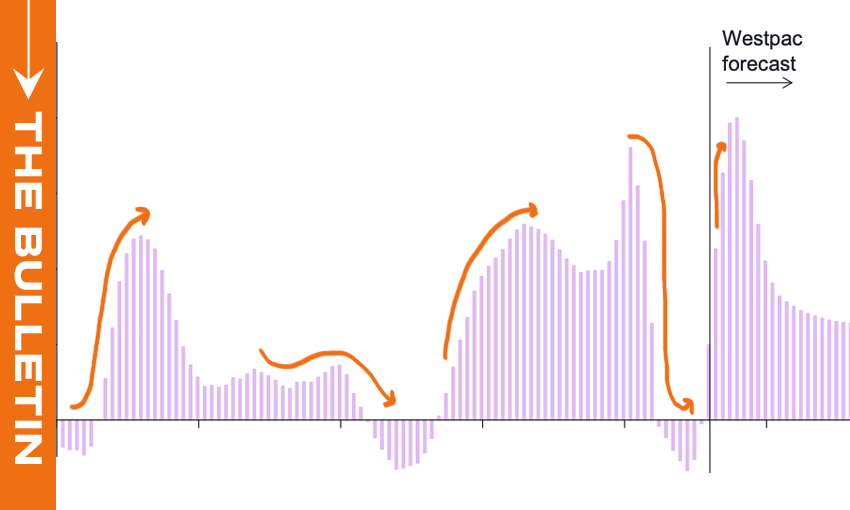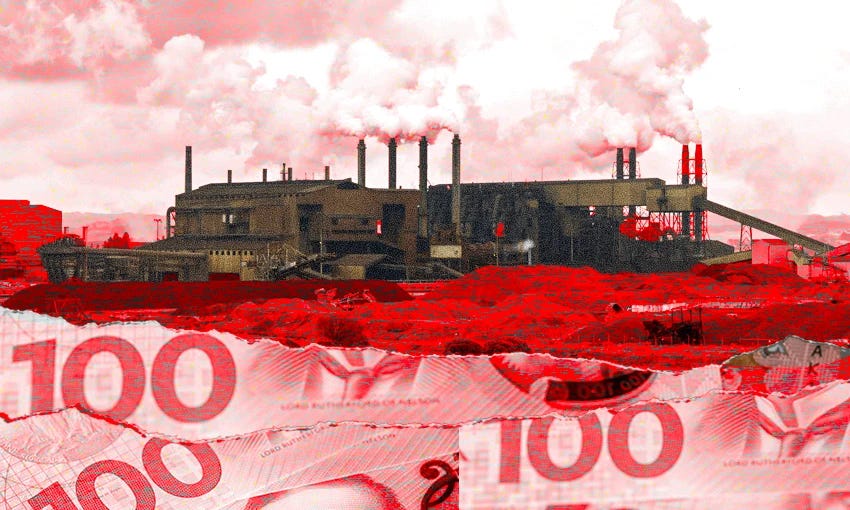Welcome to the immigration resurgence?
Net migration figures have bounced back fast and are being cited as a key factor in tomorrow's OCR decision but is it a sustained trend or a spike?
Mōrena and welcome to The Bulletin for Tuesday, May 23 by Anna Rawhiti-Connell. Presented in partnership with Z Energy.
In today’s edition: the prime minister’s whirlwind visit to Papua New Guinea; foodbanks see donations fall back; Loafers Lodge had just one working ground-floor exit in the days before fatal fire; but first, are we seeing a sustained migration surge or a temporary spike?
Westpac economists plot Stats NZ net migration data from 2000 and forecast the fastest rate of population growth New Zealand has seen in decades by the end of this year (Image: Westpac NZ's latest economic overview, Tina Tiller)
Treasury predicts a drop-off after spike
In the last 18 months, we’ve had the immigration reset, the immigration rebalance, the immigration u-turn and now, what appears to be the immigration resurgence. It’s almost enough to warrant an Eras-like tour but instead of Taylor Swift trying to find her mark on stage, it’s forecasters, economists, policy-makers and politicians trying to establish a mid-term view on exactly what might happen with net migration. Newsroom’s Jono Milne leans into the sense of befuddlement by asking “What the hell’s going on with migrant workers?” Milne points to the faster-than expected surge in net migration and the equally-as-fast fall Treasury is predicting. “The strange and short-lived spike in migrant workers has confounded the government and risks plunging the economy into a recession – just as Treasury had predicted we might avoid one,” he writes.
Is the spike really short-lived?
BusinessDesk’s Jem Traylen counters on Treasury’s predictions (paywalled) by noting that the figures used in the budget estimate of net migration are already out of date. As Traylen notes, the Treasury forecast “is the key economic variable underpinning the rest of their economic outlook, as well as gauging the demand for housing and public services.” Is the spike we’ve seen due to pent-up demand after border closures or will “the tight labour market mean demand for migrant labour is likely to be sustained at a much higher level for a lot longer?” Peter Wilson, one of the experts advising the Productivity Commission’s inquiry on immigration settings, told Traylen the last time migration crashed like Treasury is expecting it to in the next couple of months, is because we closed the border.
Disturbance in the force
Westpac economists are predicting that the Reserve Bank (RBNZ) will need to raise the Official Cash Rate (OCR) to as high as 6%. The RBNZ makes its next OCR announcement tomorrow. While acknowledging a lot of uncertainty, the economists say the surge in migration “has the potential to disturb the grand plan” the Reserve Bank has for reining in inflation. Westpac economists are forecasting a net inflow of 100,000 people over 2023, adding almost 2% to New Zealand’s population. That would be the fastest rate of population growth New Zealand has seen in decades.
Hail to the bus drivers
In a real world example of the see-sawing on immigration policy, and in news that will give commuters cause to cheer, 559 new bus drivers have been recruited and a return to full service is in sight. The government further loosened immigration settings in December, essentially obliterating any remnants of the great immigration reset or rebalance, and created a temporary residence pathway for bus and truck drivers. Bus drivers from the Philippines, India and Fiji have filled vacancies. Great for commuters and business, but the eternal question about what the population of this country should be and how we ensure growth is accounted for, remains unsettled. Paul Spoonley is calling for a government population statement, writing that “we need to know what population growth rates are sustainable and make sense alongside labour market supply needs, infrastructural provision and equity for New Zealand communities, immigrant or host.” Finally, and I think I can get away with saying this is tangentially related, the ratio of sheep to people in New Zealand has fallen below five to one for the first time since the 1850s according to Stats NZ's Agricultural Production Census for 2022.
A message from Jane Yee, head of podcasts at The Spinoff
All the work we do here at The Spinoff, including our audio content and newsletters, is only possible thanks to the support of our members. We’d love you to help us keep delivering independent media that’s free for everyone. If you value what we do and have the means to do so, please make a donation today.
The PM in PNG
Stewart Sowman-Lund was in Papua New Guinea yesterday as prime minister Chris Hipkins undertook what Sowman-Lund describes as “bilateral speed dating”. The whirlwind trip saw him meet with Papua New Guinea prime minister James Marape, US Secretary of State Antony Blinken and Indian prime minister Narendra Modi. Hipkins was welcomed like royalty at Gordon’s Market, a recent redevelopment significantly supported by New Zealand. The big geo-political news was the signing of a security pact between the US and Papua New Guinea which will eventually result in the largest military presence in the area since World War Two. The pact has faced criticism, with university students from around Papua New Guinea protesting the signing. Hipkins was reluctant to be drawn into conversations about the pact, telling media it was ultimately an issue for the respective Pacific countries to address. “New Zealand doesn’t support militarisation of the Pacific. Having said that, a military presence doesn’t necessarily signify militarisation,” he said.
Food banks receiving less donations as cost of living crisis continues
The Aotearoa Food Parcel Measure, a visual dashboard which illustrates how many food parcels are being given out and how many people are being fed, indicates that the nationwide number of food parcels distributed in March was 3422 fewer than at the start of the year. As RNZ’s Finn Blackwell reports, several food banks in the North Island are reporting a shortage in donations. As the cost of living crisis continues, with the biggest annual increase in food prices in more than 30 years reported last month, some who rely on foodbanks are being turned away as charities struggle to meet demand. Wellington City Missioner Murray Edridge said they've seen a tripling in demand compared to three years ago when the pandemic first hit.
One working ground-floor exit at Loafers
The Post’s Tom Hunt reports (paywalled) that Loafers Lodge had just one working ground-floor exit in the days before the fatal fire where at least five people died and a further 10 remain unaccounted for. On Saturday, it was reported by The Post that the Fire Service (now Fire and Emergency NZ) repeatedly raised safety issues with Loafers Lodge when the building was converted into accommodation. Yesterday, the sister of Wellington street identity “Mike the Juggler” confirmed that he was one of the fatalities from the fire. The scene investigation is continuing with the police reporting last night that progress continues to be made.
Click and Collect
A potential primary school teacher strike at the end of the month is on hold with constructive talks underway with education minister
Te Whatu Ora takes court action against nurses
National supports looking at a ban on disposable vapes
From Friday, you will be able to transfer money between different banks without a delay, seven days a week — including public holidays
Iam Tongi becomes first Pacific Islander to win American Idol — if you’ve ever wanted to cry along with Lionel Richie and Katy Perry, here’s your chance
Got some feedback about The Bulletin, or anything in the news? Get in touch with me at thebulletin@thespinoff.co.nz.
If you liked what you read today, share The Bulletin with friends, family and colleagues.
Duncan Greive looks at the moral dilemma facing the government as they continue to subsidise polluting steel manufacture. Wellington's train network has a "wee" problem, says Emma Maguire. Poet Kevin Ireland died last week; writers Sue Orr and Bill Manhire remember his generosity (and an unfortunate typo). Businesses love Google Reviews, and one of New Zealand's lapsed celebrities loves writing them, discovers Alex Casey.
Sporting snippets
The Bounce’s Dylan Cleaver read a fairly dry infrastructure report so we don’t have to and uncovered this factoid about Te Kaha, the soon-to-be stadium in Christchurch: “Examples like the Christchurch Stadium, which is one of the most expensive rugby stadiums in the world on a cost per seat basis, suggest that our challenges with complex, largescale projects go beyond transport”
Javelin thrower Tori Peeters broke her own national record to place second at the Yokohama Grand Prix in Japan
Everyone seems to be loving Super Rugby this year — Chris Rattue (paywalled) says the impression Mark Robinson is trying to create about engagement around Super Rugby being positive “is wrong, dead wrong”; and Justin Marshall just straight up changed the channel to watch league during the Crusaders and Moana Pasifika game on Friday night.
RIP the Metaverse
Look, I confess to forgetting the Metaverse existed because I'm increasingly attracted to neo-luddism but apparently the pet project of Mark Zuckerberg, once touted as a $13 trillion dollar opportunity, is dead. There may be a few people still virtually rolling round the place, legless, but as this damning obituary from Insider confirms, Meta (let us not forget the entire Facebook company was renamed to herald the promise of the ‘verse) is now firmly invested in artificial intelligence. The company is no longer pitching the Metaverse to advertisers. Meta has just been hit with a record $1.3b (NZ$2.24b) data privacy fine by the European Union so I am sure no longer having to pay for the upkeep of a universe will be helpful in paying that.











Sorry to be pedantic but it surely it should be “fewer” donations not “less”. I realise it’s now common usage but it really grates!
On Immigration: If we don't have enough people to service our current population, how do we cope if we increase it?
It might be nice to allow bus drivers to come here so teachers can get to work, but then we need more teachers for their children. It is a never-ending spiral.
We already work more hours each than almost any other country. Why is our productivity so low? Why do we insist on doing so many useless activities to keep our GDP from tanking?